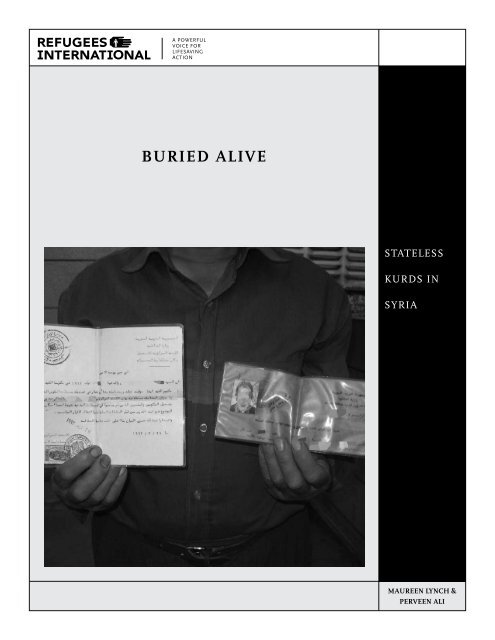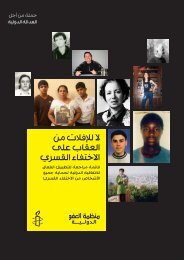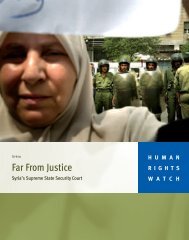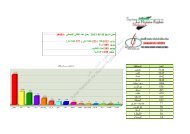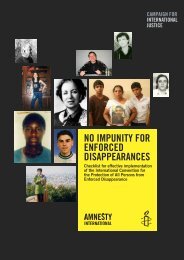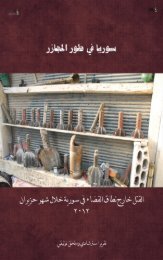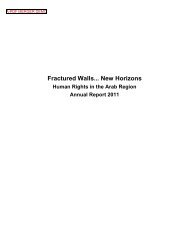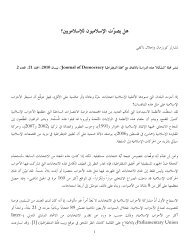BURIED ALIVE
BURIED ALIVE
BURIED ALIVE
Create successful ePaper yourself
Turn your PDF publications into a flip-book with our unique Google optimized e-Paper software.
A POWERFULVOICE FORLIFESAVINGACTION<strong>BURIED</strong> <strong>ALIVE</strong>statelesskurds insyriaMaureen Lynch &Perveen Ali
AcknowledgmentsWe would first like to offer a true “thank you”to each family and individual who willingly andcourageously told us their story. Appreciation isalso due everyone who provided support for theoriginal field visit on which this project is basedand who helped in the production of this report.In addition, we would like to acknowledge theassistance of Mr. Sherkoh Abbas, a representativefor Syrian Kurds in the U.S., who contributedmuch to the information gathering, field logistics,and editorial comment on documents producedfor advocacy on behalf of stateless Kurds.Maureen Lynch and Perveen Alier, and Bernice Romero for their interest andsupport.Cover photo: A statelessKurd in Syria holds hisAjnabi “red card” (on theright) and the identitydocument belonging tohis Maktoumeen wife(on the left).© Refugees International/Maureen LynchJANUARY 2006<strong>BURIED</strong> <strong>ALIVE</strong>: STATELESS KURDS IN SYRIA
Table of ContentsOverview . . . . . . . . . . . . . . . . . . . . . . . . . . . . . . . . . . . . . . . . . . . . . . . . . . . . . . . . . . . . . . . . . . . . . iIntroduction . . . . . . . . . . . . . . . . . . . . . . . . . . . . . . . . . . . . . . . . . . . . . . . . . . . . . . . . . . . . . . . . . . 1The Creation of Stateless Kurds in Syria . . . . . . . . . . . . . . . . . . . . . . . . . . . . . . . . . . . . . . . . . . . 1Fundamental Human Rights Denied . . . . . . . . . . . . . . . . . . . . . . . . . . . . . . . . . . . . . . . . . . . . . 2The Right to a Nationality & an Identity . . . . . . . . . . . . . . . . . . . . . . . . . . . . . . . . . . . . . . . . . 3The Right to Education . . . . . . . . . . . . . . . . . . . . . . . . . . . . . . . . . . . . . . . . . . . . . . . . . . . . . . 3The Right to Employment . . . . . . . . . . . . . . . . . . . . . . . . . . . . . . . . . . . . . . . . . . . . . . . . . . . . 4The Right to Health . . . . . . . . . . . . . . . . . . . . . . . . . . . . . . . . . . . . . . . . . . . . . . . . . . . . . . . . . 5The Right to Marry . . . . . . . . . . . . . . . . . . . . . . . . . . . . . . . . . . . . . . . . . . . . . . . . . . . . . . . . . 6The Right to Own Property . . . . . . . . . . . . . . . . . . . . . . . . . . . . . . . . . . . . . . . . . . . . . . . . . . . 6The Right to Freedom of Movement . . . . . . . . . . . . . . . . . . . . . . . . . . . . . . . . . . . . . . . . . . . . . 7Human Smuggling & Trafficking . . . . . . . . . . . . . . . . . . . . . . . . . . . . . . . . . . . . . . . . . . . . . . . . 7Arbitrary Detention & Torture . . . . . . . . . . . . . . . . . . . . . . . . . . . . . . . . . . . . . . . . . . . . . . . . . . . 8Relationship with UN Bodies . . . . . . . . . . . . . . . . . . . . . . . . . . . . . . . . . . . . . . . . . . . . . . . . . . . . 9Resolving the Problem . . . . . . . . . . . . . . . . . . . . . . . . . . . . . . . . . . . . . . . . . . . . . . . . . . . . . . . . . 9Refugees International’s Recommendations . . . . . . . . . . . . . . . . . . . . . . . . . . . . . . . . . . . . . . . . 10www.refugeesinternational.org
overviewSyria is at a critical crossroads, faced with a timely opportunity to maintain stability andsecurity in the country by realizing the nationality and its concomitant rights of all residents.In particular, an estimated 300,000 stateless Kurds live within the country’s borders, but arein a unique situation in relation to the larger Kurdish population due to a 1962 census that ledto their denationalization.“Promises are madeby the authorities,but in practicallife there areno changes.”The lack of nationality and identity documents means that stateless Kurds, for all practicalpurposes, are rendered non-existent. Their basic rights to education, employment, propertyownership, political participation, and legal marriage are severely limited, relegating them tothe outermost margins of Syrian civil society. “It is like being buried alive,” said one man.In an attempt to mitigate the desperation of their plight, some Kurds have begun to mobilizethemselves to advocate for their recognition. Others take tremendous risks to leave Syriaillegally and seek opportunities abroad. However, those caught may be deported back, imprisoned,and subjected to harsh treatment. Individuals who actively tried to change the situationfor stateless Kurds have also been detained and tortured.In his speech on November 10, 2005, President Bashar Al-Assad of the Syrian Arab Republicsaid that he wants to resolve issues of nationality in the Hassakeh region. “We will solve thisissue soon in an expression of the importance of national unity in Syria.” But over the years,many government promises about resolving the plight of stateless Kurds have been made andbroken. “Promises are made by the authorities, but in practical life there are no changes,” onestateless man told Refugees International.While the Syrian government deserves credit for decades of assistance to hundreds of thousandsof Palestinians, and now to the growing number of Iraqi refugees present on theirterritory due to the ongoing crisis in Iraq, it must recognize in a concrete way the rights ofhundreds of thousands of individual Kurds within its own borders who have been arbitrarilydenied the right to Syrian nationality. The Syrian government needs to repeal all draconianrestrictions on the free expression of Kurdish cultural identity and grant citizenship toindividuals who lack it.President Al-Assad needs to make good on his promises now. For only when the statelessKurds in Syria have been fully nationalized and the broader issue of the Kurdish place inSyrian political, social, and economic life has been addressed can peace and security withinSyria be realized.Refugees International recommends that:The Government of Syria• Take immediate and concrete steps to fulfill the promise to grant citizenship to all individualslacking effective nationality in accordance with Article 3 of the Syrian Nationality Act andinternational law.• Repeal all laws and decrees which deny Kurdish people in Syria the right to enjoy their ownculture and language.• Begin a program of reparations and development for Kurds who lost property and status in1962 that is at the same time sensitive to the rights of Arab occupants.i<strong>BURIED</strong> <strong>ALIVE</strong>: STATELESS KURDS IN SYRIA
• Ensure every child born in Syria has the right to acquire a nationality and is not stateless.• Enact legislation to permit passage of nationality from mother to child.• Become party to the 1954 Convention Relating to the Status of Stateless Persons and the1961 Convention on the Prevention of Statelessness.The UN High Commissioner for Refugees• Broaden its focus and operations to include stateless persons in addition to refugees asmandated.• Work with the Syrian government to end statelessness in the country, including affectedKurds.• Provide relief consistent with its agency mandate to address stateless people.• Identify a staff team to work actively on ending statelessness in Syria.• Open UNHCR branch offices in regions of the country where statelessness is most severe.The United States & Concerned Governments• Establish a clear policy on Kurds in Syria, urging the Syrian government to resolve thestatelessness issue.• Refuse to become party to agreements with Syria until the fundamental rights of Kurds areupheld, particularly the EU’s formation of the Mediterranean Partnership with Syria.• Include more details on conditions faced by stateless persons in annual human rightsreports.• Support the development of civil organizations, including ones to achieve greater communicationand understanding between Syrian Arabs and Kurds.Only when thestateless Kurdsin Syria have beenfully nationalizedand the broaderissue of theKurdish place inSyrian political,social, andeconomic life hasbeen addressedcan peace andsecurity withinSyria be realized.www.refugeesinternational.orgii
uried alivestateless kurds in syriaAs a whole, Kurdsin Syria continueto face obstaclesto securing theirbasic rights.introductionStateless Kurds in Syria are virtually invisiblepeople. Numbering about 300,000, thisgroup is in a unique situation in relation tothe larger Kurdish population. There areno exact figures for the number of Kurds inSyria because of the political implicationsof over- or underestimation, although it isgenerally believed that between 8 and 15percent of the country’s population of 18million is Kurdish. About half of them livein the northeast section of the country(Hassakeh and Jazeera) and in Afrin andnorthern Aleppo. The other half is dispersedthroughout the urban centers of Damascusand Aleppo. In addition, large numbers ofSyrian Kurds are living in Lebanon andthroughout Europe.As a whole, Kurds in Syria continue to faceobstacles to securing their basic rights. Thelegacy of the state’s “Arabization” andnationalism campaigns of the 1960s and70s, conducted with the objective of gainingcontrol of all internal social spheres byrestricting political and civil rights in thename of internal stability, continues to thisday. Discriminatory regulations ban use ofthe Kurdish language Kermanji (including inconversation, publications, the names ofchildren, and place names), cultural displays(such as playing Kurdish music), and theformation of Kurdish civil and politicalgroups. The creation of a Kurdish autonomouszone in Iraq pushed the Kurdish issueto the forefront in Syria where statelessKurds seek citizenship and recognition as amajor group in the country.The main obstacle to a solution of thenationality question is political. Over theyears, the government has failed to recognizethe size of the problem in order topreserve the domination of political andsocial life by the ruling party of the Al-Assadfamily and its allies, who represent theinterests of the Arab majority. The denialof citizenship is part of a broader effort toprevent any legal expression of Kurdishnationalism on Syrian soil. Some Syrianofficials deny that any problem exists,maintaining that only a small number offamilies live without nationality. Only whenthe stateless Kurds in Syria have been fullynationalized and the broader issue of theKurdish place in Syrian political, social, andeconomic life has been addressed can peaceand security within Syria be realized.The Creation of StatelessKurds in syriaThe majority of Kurds are divided betweenTurkey, Iraq, Iran, the former Soviet Union,and Syria. Some of Syria’s Kurds becamestateless when a census was conducted in1962 in the Hassakeh governorate underDecree No. 93. An estimated 120,000 peopleor about 20 percent of Syrian Kurds losttheir citizenship, a number which has sincemore than doubled to approximately300,000 at present. Many persons who losttheir nationality also later lost rights to theirproperty, which was seized by the governmentand used for the re-settlement ofdisplaced Arabs. The Kurds whose land wasseized were not compensated for theirlosses. Moving Arabs onto this land ensuredthat a strong barrier of Arabs existed alongthe border of Turkey between the Kurdsliving in Turkey and in Syria.The census reflected a political agenda toArabize the northeast, an area rich in naturalresources, and to identify recent illegalmigrants from Turkey. To retain their citizenship,Kurds had to prove residence in Syriadating from 1945 or before. Implementationof this order went awry. Even Kurds withproof of residence lost their nationality;others were compelled to pay large bribes toretain it. One man stated, “The grave of my<strong>BURIED</strong> <strong>ALIVE</strong>: STATELESS KURDS IN SYRIA
grandfather is here in Syria; our family hasbeen here for over 100 years, but we lost ournationality in 1962.” To this day manyfamilies have members who are nationals andothers who are not. Fathers have nationality,while their children do not; one man hasnationality while his brother does not. Manystateless Kurds also report having familymembers who served in the Syrian militaryand whose nationality was then rescindedupon completion of their service.The results of the census of 43 years agocontinue to cause great suffering. “You can’timagine the condition of people without anationality,” one man said. “It violatesinternational laws to which Syria is a signatoryand Syrian domestic law itself.”According to documentation prepared by theUN High Commissioner for Refugees, Article3 of the Syrian Nationality Act stipulates that aperson is considered legally Syrian if he orshe is:a) Born inside or outside the Syrian ArabRepublic of a Syrian father;b) Born inside the Syrian Arab Republic of aSyrian mother but never proven legallydescendant of his father;c) Born inside the Syrian Arab Republic ofunknown parents, parents with anonymousnationality or parents with no nationality.Foundling children in the Syrian ArabRepublic are considered Syrian born (andregistered in the area they are found in)unless proven otherwise;d) Born in the Syrian Arab Republic and wasnot able at birth to acquire (by virtue ofpaternity) foreign nationality;e) One who is originally Syrian but neitheracquires another nationality nor applied forSyrian citizenship within the appointedtimes of previous legislations. This Articleapplies even if date of birth of concernedperson is prior to the date of this legislationcoming into force.The law also states that Syrian nationalityshall be given to foreigners by special decreeafter a written application proving that theapplicant:• Is legally competent;• Has lived in the Syrian Arab Republic forfive consecutive years;• Is free from infectious diseases and physicaldisabilities hampering him from work;• Is of good repute;• Has not being previously convicted;• Has a specialty or experience incertain fields;• Has fair knowledge of written andspoken Arabic.As it has in the past, once again this summerthe Human Rights Committee, the body ofindependent experts that monitors implementationof the International Covenant onCivil and Political Rights by its State parties,called on Syria to “protect and promote therights of non-citizen Kurds.” The EuropeanUnion has also sent a letter signed by severalmember states to President Al-Assad urginghim to rectify this prolonged situation.Fundamental HumanRights DeniedThe difficulties faced by stateless Kurds inSyria are numerous, despite Syria’s obligationsas a signatory to the Universal Declarationof Human Rights, the InternationalCovenant on Civil and Political Rights, theConvention on the Rights of the Child, andthe International Convention on the Eliminationof All Forms of Racial Discrimination.Individuals have irregular access toeducation, health care, livelihoods, travel,property ownership, judicial and politicalsystems, and registration of businesses,marriages, and children. They cannot vote orrun for public office.“You can’t imaginethe condition ofpeople withouta nationality.”www.refugeesinternational.org
“After finishinguniversity, thepainful life began.We saw ourclassmates andfriends get jobs andbuy houses,according to theirlessons… Now I am43 years old. I am alawyer by training,but I, my wife, andchildren work in ashop moving heavyappliances.”Statelessness affects every part of daily life.“Our condition is worse than that of acriminal,” a man from Qamishli said. “Theycan own a car or house. We can’t.” A youngwoman told RI, “When I was young, I wasnot sensitive to my status. Now I know itwill affect my education, my job, and mymarriage.” The births and deaths of someMaktoumeen (individuals lacking identitydocuments; the term is defined as “hidden”by some and “unregistered” by others) gounrecorded and their murders are reportedlynot investigated or prosecuted as aresult of their status. They are people whonever existed. One young stateless mansummed up this treatment in a singlestatement: “The Syrian government wants toerase us.”The Right to a Nationality & an IdentityMost denationalized Kurds and theirdescendents are labeled Ajanib (“foreigners”)and issued red identity cards by the Ministryof Interior, stating they are not Syriannationals and are not entitled to travel. Evensome children listed on red cards are listedunder the statement, “His name was not inthe survey of 1962,” an irony given that theywere born long after the date of the census.Replacing such documents or obtaining themfor the first time poses particular problems,as they often involve paying large bribes of upto SYP 3,000-5,000 (US $60-100) andapproaching several branches of security forauthorization over the course of months oreven years.A significant number of stateless Kurds inSyria do not possess even this identitydocument and are effectively invisible.Maktoumeen now number between 75,000and 100,000. At one time, they were able toobtain certified “white papers” recognizingtheir identity from their local mayor’s office(a Mukhtar or traditional village head),although these papers were not recognizedlegally by the government. However, thispractice has now ended under special ordersfrom the Syrian government. One manreported being arrested for possessing nolegal documentation and was in prison forthree months. Another reported beingharassed by the police who called him namesand tore up his white paper in front of him.“The Maktoumeen have the worst situationyou can imagine,” one person told RI.“We want humanity. We want respect ashuman beings,” one man said. “Syria is acountry of Kurds and Arabs.” “Even withthese conditions, we live for this change,”agreed another.The Right to EducationThe Syrian government recognizes the rightof Kurdish children to primary education,but not to primary education in their nativeKurdish. Stateless Kurds face difficultiesenrolling in secondary schools and universities,and Ajanib were reportedly notpermitted to enroll in universities until after1978. Enrolling in university provesnonetheless to be an arduous task, as Ajanibare required to obtain a report from statesecurity in order to attend university andagain upon graduation. This report containsinformation about the student’s parents,travels, friends, and political involvements.Maktoumeen sometimes use the name of anational or foreigner so they can study,albeit illegally.Kurdish students study with Syrian Arabtextbooks and are compelled to reciteversions of history that contribute to theirinvisibility in the country. Stateless universitystudents generally do not have the rightto participate in school activities such asathletics teams, social clubs, or competitionsor to pursue their professions aftergraduation. Even those Ajanib who domanage to enroll, find it impossible toobtain employment in many of their fieldsof expertise. Ajanib are restricted fromgovernment jobs and the practice of law,pharmacy, or medicine and practice otherprofessions such as teaching or engineeringin severely restricted ways.<strong>BURIED</strong> <strong>ALIVE</strong>: STATELESS KURDS IN SYRIA
It is next to impossible for Maktoumeen toaccess higher education. Not only must thechildren go through considerable administrativeprocesses and delays in registering forprimary education, but they must also obtainpermission from state security to attendsecondary school. Maktoumeen children donot receive a diploma from secondary school,preventing their university enrollment.Some parents even report listing theirchildren under the names of relatives whohave nationality in order to facilitate theiraccess to school.No stateless Kurds, even those at the top oftheir class, can access government scholarshipsfor post-graduate education abroad,and unlike Syrian nationals, they cannotreceive government loans or stipends fortheir undergraduate university education. Inaddition, stateless Kurds with a disabilitycannot obtain state-funded special education.One young Kurdish girl was prevented fromgoing to a school for disabled childrenbecause she is Maktoumeen. A youngMaktoumeen man was reported as havingthe highest marks in his high school class,but upon graduation was not provided with adiploma and unable to apply for college. Heis now working selling tea in front of theUniversity of Damascus, where he haddreams of one day attending. AnotherAjnabia woman remembers how her Arabprimary school teacher would humiliate herin front of her class by asking, “Where isyour father really from?”The Right to EmploymentWith limited access to employment, amajority of stateless Kurds in Syria works twoto three jobs at any given time in the informalsector or practices professions without alicense or in an extremely limited capacity.They cannot practice agriculture on the landwhich was taken from them. Moreover, moststateless Kurds are not permitted to becomemembers of professional labor unions, withthe exception of the Engineers’ union on alimited basis. “I work night and day, but stillhave nothing,” a Maktoumeen man told RI.“Because our life is hard, we think only ofhow to eat.”In rare cases in which the state is facing ashortage in a particular profession, thegovernment makes arbitrary exceptions. Forexample, a shortage of teachers in Qamishliled the government to permit hiring statelessKurds as teachers on a part-time or daylaborer basis, meaning that they had nocontract and benefits and could be terminatedat any time. In another case, the need formore engineers led the government to permitstateless Kurds to work as engineers ongovernment projects, but this program wasterminated after two years when it wasdeemed they were no longer needed. Oneman reported actually obtaining governmentemployment, but after one year, they discoveredthat he was Maktoumeen, fined him,and fired him from his job. Private hotels andrestaurants are required now by law to consultstate security before hiring any Kurds.As a consequence, it is not uncommon to finda doctor who sells tea on the street, a lawyerwho works as a barber, a man who waseducated as a teacher transporting flour sacks,and another who left his family in thenortheast region to work in a Damascus hotelrestaurant. Earnings for such work averagearound SYP 6,000 (US $120) per month,nearly half of which must go to pay rent forhousing and barely supports a family of fourfor more than two weeks. One man stated, “IfI work night and day, I will gain nothing, justsurvive.”Due to the inability to find employment, oneSyrian Kurdish man explained how he lost hiscitizenship in the 1962 census, but then in1975 agreed to sign a statement that he was aSyrian Arab in order to retain rights associatedwith Syrian citizenship. This was anoption offered by the Syrian government inthe late 1970s to some of the Ajanib who losttheir nationality in 1962; however, mostAjanib refused as a matter of principle, andthe practice was effectively ended by 1980.One man stated,“Kurdish peoplewant to return totheir lands, but areinstead obliged tomigrate to cities towork and livemiserable lives.”www.refugeesinternational.org
“Once I neededto travel fromQamishli toDamascus toreceive medicaltreatment, butthe bus companyrefused to issueme a ticket; so Ihad to buy a ticketusing the identitycard of a relativewho has Syriannationality,” oneman explained.Unlike the Maktoumeen, Ajanib can obtaindrivers licenses and cash checks, but neitherare permitted to open bank accounts orobtain commercial drivers licenses. OneMaktoumeen man reported receivingpaychecks or entering into contracts for workunder the name of a friend who has nationalityin order to be able to receive and cashpaychecks at banks.Another Maktoumeen man described howcompanies often exploit Maktoumeen labordue to lack of documentation. He stated, “Ihad contracted with a government-ownedcompany to do a construction job layingtelephone lines with a crew of men that Ihired. The company agreed to pay me SYP85,000 (US $1,700), but after we finishedthe work, the company refused to pay me.They said that I do not possess an identitycard and therefore cannot receive a paycheck.Now I have to find some other way topay the men who I hired for this project.”Economic consequences of limited access tothe labor market and lack of trust in theeducation system compel many Maktoumeenchildren to work picking cotton,selling cigarettes or lottery tickets, cleaningwindows, shining shoes, working as porters,and helping in mechanic shops. Many childlaborers are exploited in the market andforced to pay the police bribes in order tocontinue their work. A number of thesechildren suffer from ailments connected withpoor nutrition, such as anemia and rickets.Many stateless Kurds residing in the northeasthave also been compelled to move intolarger urban centers such as Damascus,Homs, Hama, or Latakia to find work in theinformal sector. In the neighborhood of WadEl Mashariya Zor Ava, on the outskirts ofDamascus, for example, nearly 2,000stateless Kurdish families, many of whomwork in construction, are living in settlementsconstructed without legal buildingpermits. Most of these families have relativesand close family members still living in thenortheastern region of Syria. Unemploymentin this neighborhood has been associatedwith increasing levels of petty crime, pooracademic performance, isolation, anddepression amongst Kurdish youth.The Right to HealthStateless Kurds are prohibited from accessingSyrian public health services or hospitals aseither employees or patients, although insome rare emergency cases, they may begranted limited admission. They are insteadforced to seek the services of private doctorsand health clinics, where costs can beprohibitive and the numbers of which arelimited. Many stateless Kurds report how it iscommon for them to use the identity cards offriends or relatives who are nationals in orderto obtain public health care. In Kurdish areasthere are no specialized hospitals, so patientsmust travel outside the northeast for care. Ayoung man, who was shot during the days ofunrest that followed a March 12, 2004incident in a Qamishli stadium in which liveammunition was used against unarmedKurdish civilians after clashes between Araband Kurdish fans erupted, said he would notbe alive except for Kurdish doctors whohelped him in a private clinic.Another stateless Kurdish man reportedhaving a life-threatening injury, which cannotbe treated in Syria. He stated, “The Syriangovernment refused to issue me with a traveldocument that would enable me to seektreatment abroad, even though my diseasecannot be treated in Syria. Once, when I wasunable to walk due to my illness, I sent mywife to obtain a bus ticket for me to travel to ahospital in Damascus to receive care. Whenshe approached the bus station, they refusedto sell her a ticket for me because ourmarriage is not officially registered, and shethus has no legal relation to me.”There is also concern about psychologicalproblems developing amongst statelessKurdish youth. One parent said, “The youthsee the Arabs and see themselves. They don’thave money. There is no place for the<strong>BURIED</strong> <strong>ALIVE</strong>: STATELESS KURDS IN SYRIA
children to play. They stay at home. Theirstudy is not good.” A 25-year-old man whoworks in food service told how he witnesseda birthday party in the restaurant with cakeand much jubilation. He cried to himselfthat he had never had and would never havethe opportunity to celebrate his own birthdaythat way. At the heart of the culture offrustration that has developed among theKurdish youth lies several concerningelements that could breed future instability,including intellectual repression, culturalresentment, and economic disparity.The Right to MarryOfficial marriage registration is a particularlypainful point for many stateless Kurds.Male nationals who marry women who areAjanib may register their marriages andpass their status to their children. All othermarriages, such as those between Ajaniband Maktoumeen or a marriage between astateless man and a woman who is a Syriannational, cannot be registered officially, evenif a court decree is obtained recognizing themarriage. One man reported that he wasonly able to legalize his marriage aftertwelve years of approaching differentbranches of security and obtaining a courtdecree recognizing the marriage.Married couples in such families are listedon their identity cards as “single,” whichposes problems for the registration ofchildren on family identity cards and evenprevents husband and wife from sharing aroom in a hotel. It is sometimes difficult toobtain birth certificates for children whenthe parents do not have a marriage certificate.Many Kurdish families who haveSyrian nationality refuse to allow theirchildren to marry Ajanib or Maktoumeenfor these reasons.Other Kurds feel that status should not bean issue when it comes to marriage, as theKurds as a group must demonstratesolidarity. One Syrian Kurdish nationalstated, “I sympathize with them; I mustpersuade all Kurdish citizens not to refusethis kind of marriage. We see this as thewhole community’s problem, even thoughonly about 10 percent of us are stateless.” Afather of seven said, “My first daughter whohas nationality married a stateless man as away to solve his problem because he couldthen register their property in her name. Astateless woman reported leaving thecountry illegally to marry and register undera different family name. “When she comeshere [Syria], she isn’t our sister,” her bloodbrother said.The Right to Own PropertyOwnership and registration of businessesand property is also difficult. With nonationality, Kurds cannot obtain propertydeeds or register cars or businesses.“I am very muchin love with awoman, but herfather refused toallow us to marry,telling me thatbecause I haveno nationality,I have no future…To this day we bothremain single.”WIFEHUSBANDCan their marriagebe legally registered?Can their childrenbe legally registered?Maktoumeen National NO YES—under fatherMaktoumeen Ajanib NO YES—under fatherMaktoumeen Maktoumeen NO NOAjanib National YES YESAjanib Ajanib NO YES—under fatherAjanib Maktoumeen NO NONational National YES YESNational Ajanib NO YES—under fatherNational Maktoumeen NO NOwww.refugeesinternational.org
One woman describeda man whowent with peoplesmugglers: “On theway, he was shipwreckedand left onan island with 25other people andwith little food orwater for 14 days…They knew they weregoing to die andbegan digging theirgraves by hand.They were rescuedby an Australianpilot who happenedto be flying overthe island…”Ironically, they are still required to payproperty taxes to the government on the landthey do not legally own. Some register theirproperty under the names of friends orrelatives who are nationals to circumventthese issues. Yet this arrangement forcesthem to rely upon the good faith of suchpersons, and the problem still remains thatthey cannot pass on ownership of property totheir children. One man described how hesold his house, but the new owner is unableto move in because the current tenants whoare renting the house refuse to leave, and hehas no legal recourse to evict them due to hislack of registered legal ownership of theproperty.Individuals who marry Syrian nationalsoften register property under the names oftheir spouses. Passing the property title on totheir children is dependent upon how closelythe spouse’s family adheres to custom. Insome instances of divorce, the spouse withnationality will retain the house, even if thestateless spouse purchased it. In other cases,many stateless Kurds are living in housesregistered to the names of previous Arabowners, even though they paid money topurchase them because they cannot registerthe title under their names. Hence, theirsecurity is subject to the good graces of thesellers and the government to whom theyoften pay large bribes.The Right to Freedom of MovementStateless Kurds are unable to obtain traveldocuments for purposes of travel outside ofSyria, regardless of whether it is for study,travel, attending funerals or family gatherings,or obtaining urgent medical treatment.One example cited was that of two Kurdishmusicians who were prevented fromtraveling with their troupe to attend a musicfestival outside of Syria. The InternationalCommittee of the Red Cross has agreed thatit might be possible to issue travel documentswith an invitation from abroad andSyrian government approval.Many stateless Kurds report difficulties intraveling within Syria’s borders as well. In thepast, they were required to obtain permissionfrom state security for internal travel, butrecently have been permitted to travelinternally with more freedom. However, theystill report being stopped and interrogated bypolice, forced to obtain permission if they arestudents, and prevented from staying inhotels without permission from state security.As noted above, married couples are notallowed to sleep in the same room in hotelsbecause they are listed as “single” on their redcards. Many Maktoumeen are prevented fromstaying in hotels at all due to lack of anidentity document. Those without anydocumentation often face trouble in obtainingbus tickets and are questioned by the police,even after producing a birth certificateverifying their birth in Syria.There are additional problems for Ajanibwho wish to change their residence. UnlikeSyrian nationals, they must obtain permissionfrom state security in order to changetheir place of residence. One young universitystudent in Aleppo was required to dothis when he wished to move out of thestudent dormitory.The restrictions on movement are a gravedisadvantage, preventing possible economic,academic, cultural, and civil society projectswithin the Kurdish community and in Syriaas a whole. Furthermore it contributes to theculture of frustration that has characterized alarge portion of the Kurdish population inSyria. The obstacles to free movement haveenhanced the risk of regional discontent andinstability.Human Smuggling & TraffickingHaving few options to ensure basic survivaland experiencing depressed relative development,some stateless Kurds seek theiropportunities abroad. One estimate offered toRefugees International was that up to 50,000Kurds have now left Syria, the majority ofwhom are stateless. While no official statistics<strong>BURIED</strong> <strong>ALIVE</strong>: STATELESS KURDS IN SYRIA
are available, it is said that most families havehad at least one member smuggled to anothercountry. Foreign officials confirm thatindividuals making asylum requests say theyuse traffickers to arrange their departure.Smugglers usually send from 50-100 peopleabroad at a time. There was a cited example ofone person who was able to obtain a Syrianpassport with a SYP 1 million bribe (US$20,000) paid to the government. Anotherperson described how his son plans to go withpeople smugglers to Germany because he hada medical license but is unable to practicelegally as a doctor in Syria. With no traveldocuments, individuals take tremendousrisks attempting to leave Syria, entrustingtheir safety to human smugglers and payingsums between SYP 150,000 and 600,000(US $3,000 to 12,000) per person. They riskdeath, deportation, and imprisonment asconsequences. One stateless family, who wascaught in Cyprus and deported back to Syria,spent more than three months in prison untilthey could bribe their way out. Another manspent a year and a half in prison, where hewas tortured and was rumored to have beenkilled. Many have died at sea in shipwrecks orwhile detained in prisons.Some stateless Kurds attempt to leave thecountry with false passports in order to studyand practice professions. One womandescribed how her brother went to Kazakhstanto study dentistry. He purchased anIraqi passport for US $200, added his photo,and left Syria. He is now unable to return toSyria because the false passport has expired.Another man went to Russia on an illegalpassport to study medicine and received alicense to practice. He returned to Syria andwas arrested at the border. His family had topay hefty bribes for his release.Some returnees who have red cards escapedSyria, sought political asylum in Europe,were rejected for refugee status, and thendeported back to Syria where they werereportedly detained and tortured. One man,deported from Germany after a failed asylumapplication, was sentenced to two years inprison by the high security court andseverely tortured. The average length ofdetention for seeking political asylum abroadwas reported to be three to six months.Another man died on the road while fleeingSyria, and the government refused to allowhis body to be returned to his family in Syria.One young Ajnabi student described a familyhe knows with five children who went withpeople smugglers to Egypt and were leftstranded there for six months until theyagreed to pay the smugglers SYP 1 million(US $20,000) to go to Europe. They wereafraid to return to Syria because they fearedarrest and prolonged detention.Arbitrary Detention & TortureSome Kurds have been subjected to arbitrarydetention and torture as a consequence oftheir efforts to rally for the political and legalrecognition of stateless Kurds in Syria. InJuly 2005, following the children’s demonstrationfor the rights of stateless Kurdishchildren in Syria in front of UNICEF, eightaccompanying adults were detained. Oneformer detainee explained how he wastortured and kept in solitary confinement forfourteen months. Another said his captorsput shoes in his mouth and on his head.They tortured him with electric shock and byusing “the chicken,” a technique thatinvolves stretching the persons out along along rod, binding the hands and feet ateither end, and then rotating them.In 1992 M. Jamil, an Ajnabi lawyer interviewedby Refugees International, wasarrested for his alleged involvement in acampaign to return nationality to the familiesof stateless Kurds who were deprived of it in1962. Ajanib and nationals alike participatedin the protest by posting banners and signsdemanding the stateless Kurds be given theirrights and nationality in Syria, and morethan 300 people were arrested, many ofwhom were sentenced to up to three years inprison. Mr. Jamil was detained withoutThe authoritiesaccused M. Jamil ofbeing an oppositionmember: “You Kurdsare living on ourland as guests. Youare living in ourcountry, but areagainst us... Wesaved you fromthe Turkish regime,and now you wantrights. Peoplewithout nationalityin Syria do notexceed 5–10families.”www.refugeesinternational.org
“The world hasshut its eyes to ourproblem.”charge and tortured by a gang of five menalmost to the point of death in order to forcea confession from him. He was verballyabused, beaten and punched, brutally kickedin his back, raped with a bottle, forced into atire, electrocuted multiple times with wiresattached to his genitals and toes, starved, andpsychologically tortured. He sufferedunconsciousness and severe injuries to hisspinal column and eye as a result. He wastortured along with six other accused people,three of whom were Ajanib; one man wasnearly 60 years old and bled from the rapesfor nearly five days. Mr. Jamil was kept for 21days in a 70 inch by 66.3 inch room,sometimes in solitary confinement and othertimes with another person.Relationship with UN Bodies“The world has shut its eyes to our problem,”declares a stateless Kurd. Syria and the worldcommunity, led by the United Nations HighCommissioner for Refugees (UNHCR), musttake concrete steps to end statelessness. Manystateless Kurds reportedly fear approachingthe UNHCR due to perceived politicalconnections between the United Nations andthe Syrian government. This was largelyexacerbated by the July demonstration held infront of UNICEF, when stateless Kurdish childrenand their relatives marched there askingfor the recognition of their rights and weremet with police brutality and arrests. Therewas no intervention on the part of any UNoffice or official, even after agencies wereapproached by relatives of the demonstratorsfor assistance in securing the release of theeight men who were detained.Resolving the ProblemFor purposes of ensuring both human rightsprotection of stateless Kurds and the politicalstability of Syria and the larger MiddleEastern region where Kurds reside, it iscritical that Syria take steps now to reinstatenationality to both the Ajanib and Maktoumeen.Economic and social marginalizationamongst this population is increasingly likelyto foster considerable despair, hopelessness,and unrest. Thousands of highly educatedand qualified Kurds who have much to offerto Syrian development now wait on thesidelines to become full-fledged and integratedmembers of Syrian civil society. They havemuch to offer the country in terms ofprofessional capacity, and this vast pool ofhuman resources is currently being wasted.As an intermediary step, the UNHCR, whichhas a mandate for stateless persons, shouldbe playing a proactive role in advocating forthe protection of Kurds without nationality inSyria, but has yet to act assertively on theirbehalf. The UNHCR told Refugees Internationalthat they did encourage the Syriangovernment to resolve the stateless problemupon the President’s recent visit to Hassakeh.However, there has been no evidence offollow-up other than a promised governmentinitiative to grant citizenship to 30,000stateless persons, which was frozen after theQamishli uprising. The government reportedlyconducted a confidential census ofstateless Kurds in the northeast earlier thisyear, but no numbers have been officiallyreleased.Ultimately, however, it is the obligation of theSyrian government to take steps to rectify thisserious and growing problem. The Syriangovernment should grant citizenship to allindividuals lacking effective nationality inaccordance with Article 3 of the SyrianNationality Act and with international law. Inan effort to support their integration intoSyrian society after citizenship is granted, RIencourages the Syrian government to begina program of reparations and developmentfor Kurds who lost property and status in1962 and promote the recognition ofKurdish culture and language within Syriansociety. It is also critical to ensure that Kurdshave equal opportunities for local participation.Equality will help facilitate unity.To prevent statelessness from injuring thesecurity of the nation in the future, RI urgesthe Syrian government to ensure that everychild born in Syria has the right to acquire a<strong>BURIED</strong> <strong>ALIVE</strong>: STATELESS KURDS IN SYRIA
nationality and is not stateless. One opportunityto achieve this goal is to enact legislationto permit passage of nationality from motherto child. Furthermore, RI encourages Syriato become party to the 1954 ConventionRelating to the Status of Stateless Personsand the 1961 Convention on the Preventionof Statelessness.The EU has put further pressure on theSyrian government this year to reinstate thenationality of the denationalized Kurds,including the Maktoumeen. They mustmaintain their insistence that the problembe rectified. In addition, the Syrian Kurdishdiaspora in the U.S. is becoming increasinglyactive in seeking non-violent solutionsto issues faced by national and statelessKurds alike.In November, President Al-Assad againmade a public speech announcing hisintention to resolve the problem of Kurdsdenationalized in the 1962 census. However,it remains to be seen whether there will beconcrete follow-up on these guarantees orwhether they will remain promises unrealizedfor a sizeable number of the Kurdishpopulation living in Syria.• Ensure every child born in Syria has theright to acquire a nationality and is notstateless.• Enact legislation to permit passage ofnationality from mother to child.• Become party to the 1954 ConventionRelating to the Status of Stateless Personsand the 1961 Convention on the Preventionof Statelessness.The UN High Commissioner for Refugees• Broaden its focus and operations toinclude stateless persons in addition torefugees as mandated.• Work with the Syrian government to endstatelessness in the country, including affectedKurds.• Provide relief consistent with its agencymandate to address stateless people.• Identify a staff team to work actively onending statelessness in Syria.• Open UNHCR branch offices in regionsof the country where statelessness is mostsevere.It remains to beseen whether therewill be concretefollow-up on theseguarantees orwhether they willremain promisesunrealized.refugees international’srecommendationsRefugees International recommends that:The Government of Syria• Take immediate and concrete steps tofulfill the promise to grant citizenship toall individuals lacking effective nationalityin accordance with Article 3 of the SyrianNationality Act and international law.• Repeal all laws and decrees which denyKurdish people in Syria the right to enjoytheir own culture and language.• Begin a program of reparations anddevelopment for Kurds who lost propertyand status in 1962 that is at the same timesensitive to the rights of Arab occupants.The United States & ConcernedGovernments• Establish a clear policy on Kurds in Syria,urging the Syrian government to resolvethe statelessness issue.• Refuse to become party to agreementswith Syria until the fundamental rightsof Kurds are upheld, particularly the EU’sformation of the Mediterranean Partnershipwith Syria.• Include more details on conditions facedby stateless persons in annual humanrights reports.• Support the development of civil organizations,including ones to achieve greatercommunication and understandingbetween Syrian Arabs and Kurds.www.refugeesinternational.org 10
A POWERFUL VOICE FOR LIFESAVING ACTIONphone: [202] 828–0110 n facsimile: [202] 828–0819 n e-mail: ri@refintl.org n www.refugeesinternational.org n 1705 N Street, NW n Washington, DC 20036


